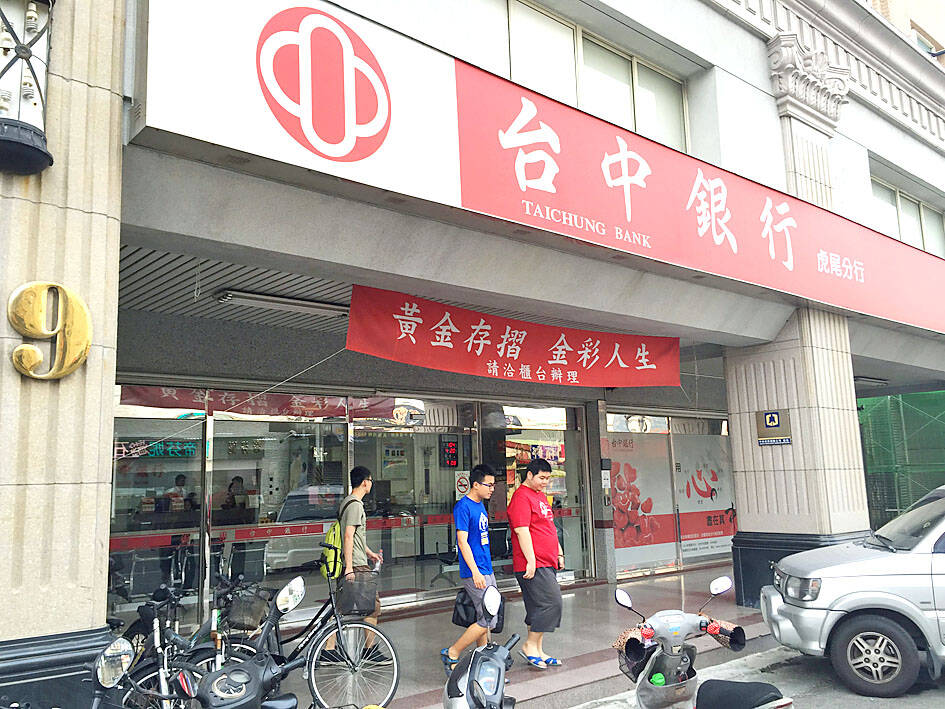Taichung Commercial Bank (TCB, 台中商銀) on Saturday said that its board of directors has approved a plan to acquire California-based American Continental Bank as part of an effort to expand its global reach.
Pending regulatory approvals, TCB said it would create a subsidiary to acquire American Continental Bancorp, the holding company of American Continental Bank, through a reverse triangular merger.
That would allow the Taiwanese bank to hold a 100 percent stake in American Continental Bancorp, it said.

Photo: CNA
TCB said it plans to acquire the US bank at US$41.48 per share, but the actual cash consideration would be determined at the deal’s close.
The cash transaction is valued at about US$82.1 million, based on the US$41.48 per share price calculated as of June 30, American Continental Bancorp said in a statement on Friday.
The transaction is expected to be competed early in the first quarter of next year, the statement said.
Founded in 2003 and based in eastern Los Angeles County, the bank primarily offers loans related to commercial real estate, small businesses, construction and residential mortgages.
Separately, the US was the largest debtor to Taiwan’s banking sector for the 28th consecutive quarter as of the end of June, with its exposure rising about 6 percent from a quarter earlier, the central bank said on Friday.
Central bank data show that outstanding claims by Taiwan’s banking sector to the US on a direct risk basis totaled US$132.63 billion as of June 30, up by US$7.25 billion, or 5.78 percent, from a quarter earlier.
The interest rate hikes this year by the US Federal Reserve raised US Treasury and bond yields, resulting in an increase in Taiwanese banks’ holdings of US debt, the central bank said.
Meanwhile, China remained the second-largest debtor to Taiwanese banks as of the end of June, with exposure of US$52.35 billion, which was a quarterly drop of US$4.42 billion, or 7.79 percent, the central bank said, attributing the decline to a stronger US dollar.
Hong Kong was in third spot, with exposure of US$35.91 billion, followed by Luxembourg with US$33.67 billion, Japan with US$29.02 billion and Australia with US$28.89 billion, the central bank data show.
Vietnam, in seventh place, showed a quarterly 8.10 percent debt increase to US$18.24 billion, as Taiwanese investors have been attracted to the Southeast Asian country amid restructuring of the global supply chain, the central bank said.
In eighth place was Singapore, with exposure of US$18.18 billion as of June 30, followed by the Cayman Islands with US$17.89 billion and the UK with US$16.97 billion, the data show.
The top 10 debtors accounted for 73.87 percent of Taiwanese banks’ outstanding international claims at the end of June, with their exposure reaching US$383.70 billion, the central bank said.

South Korea’s equity benchmark yesterday crossed a new milestone just a month after surpassing the once-unthinkable 5,000 mark as surging global memory demand powers the country’s biggest chipmakers. The KOSPI advanced as much as 2.6 percent to a record 6,123, with Samsung Electronics Co and SK Hynix Inc each gaining more than 2 percent. With the benchmark now up 45 percent this year, South Korea’s stock market capitalization has also moved past France’s, following last month’s overtaking of Germany’s. Long overlooked by foreign funds, despite being undervalued, South Korean stocks have now emerged as clear winners in the global market. The so-called “artificial intelligence

NEW IDENTITY: Known for its software, India has expanded into hardware, with its semiconductor industry growing from US$38bn in 2023 to US$45bn to US$50bn India on Saturday inaugurated its first semiconductor assembly and test facility, a milestone in the government’s push to reduce dependence on foreign chipmakers and stake a claim in a sector dominated by China. Indian Prime Minister Narendra Modi opened US firm Micron Technology Inc’s semiconductor assembly, test and packaging unit in his home state of Gujarat, hailing the “dawn of a new era” for India’s technology ambitions. “When young Indians look back in the future, they will see this decade as the turning point in our tech future,” Modi told the event, which was broadcast on his YouTube channel. The plant would convert

‘SEISMIC SHIFT’: The researcher forecast there would be about 1.1 billion mobile shipments this year, down from 1.26 billion the prior year and erasing years of gains The global smartphone market is expected to contract 12.9 percent this year due to the unprecedented memorychip shortage, marking “a crisis like no other,” researcher International Data Corp (IDC) said. The new forecast, a dramatic revision down from earlier estimates, gives the latest accounting of the ongoing memory crunch that is affecting every corner of the electronics industry. The demand for advanced memory to power artificial intelligence (AI) tasks has drained global supply until well into next year and jeopardizes the business model of many smartphone makers. IDC forecast about 1.1 billion mobile shipments this year, down from 1.26 billion the prior

People stand in a Pokemon store in Tokyo on Thursday. One of the world highest-grossing franchises is celebrated its 30th anniversary yesterday.